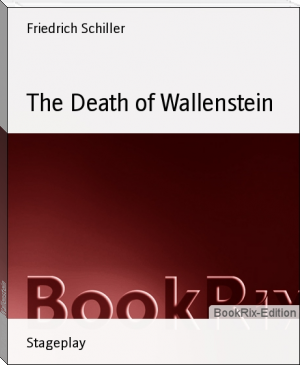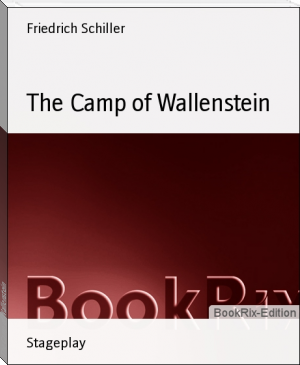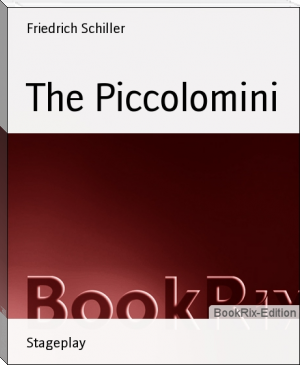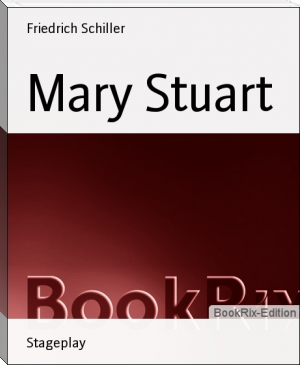The Death of Wallenstein - Friedrich Schiller (simple e reader txt) 📗

- Author: Friedrich Schiller
Book online «The Death of Wallenstein - Friedrich Schiller (simple e reader txt) 📗». Author Friedrich Schiller
immutable!
BUTLER.
For what Rail you against me? What is my offence? The empire from a fearful enemy Have I delivered, and expect reward. The single difference betwixt you and me Is this: you placed the arrow in the bow; I pulled the string. You sowed blood, and yet stand Astonished that blood is come up. I always Knew what I did, and therefore no result Hath power to frighten or surprise my spirit. Have you aught else to order; for this instant I make my best speed to Vienna; place My bleeding sword before my emperor's throne, And hope to gain the applause which undelaying And punctual obedience may demand From a just judge.
[Exit BUTLER.
SCENE XII.
To these enter the COUNTESS TERZKY, pale and disordered.
Her utterance is slow and feeble, and unimpassioned.
OCTAVIO (meeting her). Oh, Countess Terzky! These are the results Of luckless, unblest deeds.
COUNTESS.
They are the fruits Of your contrivances. The duke is dead, My husband too is dead, the duchess struggles In the pangs of death, my niece has disappeared; This house of splendor, and of princely glory, Doth now stand desolated: the affrighted servants Rush forth through all its doors. I am the last Therein; I shut it up, and here deliver The keys.
OCTAVIO (with a deep anguish).
Oh, countess! my house, too, is desolate.
COUNTESS. Who next is to be murdered? Who is next To be maltreated? Lo! the duke is dead. The emperor's vengeance may be pacified! Spare the old servants; let not their fidelity Be imputed to the faithful as a crime - The evil destiny surprised my brother Too suddenly: he could not think on them.
OCTAVIO. Speak not of vengeance! Speak not of maltreatment! The emperor is appeased; the heavy fault Hath heavily been expiated - nothing Descended from the father to the daughter, Except his glory and his services. The empress honors your adversity, Takes part in your afflictions, opens to you Her motherly arms. Therefore no further fears. Yield yourself up in hope and confidence To the imperial grace!
COUNTESS (with her eye raised to heaven) To the grace and mercy of a greater master Do I yield up myself. Where shall the body Of the duke have its place of final rest? In the Chartreuse, which he himself did found At Gitschin, rests the Countess Wallenstein; And by her side, to whom he was indebted For his first fortunes, gratefully he wished He might sometime repose in death! Oh, let him Be buried there. And likewise, for my husband's Remains I ask the like grace. The emperor Is now the proprietor of all our castles; This sure may well be granted us - one sepulchre Beside the sepulchres of our forefathers!
OCTAVIO. Countess, you tremble, you turn pale!
COUNTESS (reassembles all her powers, and speaks with energy and
dignity).
You think More worthily of me than to believe I would survive the downfall of my house. We did not hold ourselves too mean to grasp After a monarch's crown - the crown did fate Deny, but not the feeling and the spirit That to the crown belong! We deem a Courageous death more worthy of our free station Than a dishonored life. I have taken poison.
OCTAVIO. Help! Help! Support her!
COUNTESS.
Nay, it is too late. In a few moments is my fate accomplished.
[Exit COUNTESS.
GORDON. Oh, house of death and horrors!
[An OFFICER enters, and brings a letter with the great seal.
GORDON steps forward and meets him.
What is this It is the imperial seal.
[He reads the address, and delivers the letter to OCTAVIO with
a look of reproach, and with an emphasis on the word.
To the Prince Piccolomini.
[OCTAVIO, with his whole frame expressive of sudden anguish,
raises his eyes to heaven.
The Curtain drops.
FOOTNOTES.
[1] A great stone near Luetzen, since called the Swede's Stone, the body of their great king having been found at the foot of it, after the battle in which he lost his life.
[2] Could I have hazarded such a Germanism as the use of the word afterworld for posterity, - "Es spreche Welt und Nachwelt meinen Namen" - might have been rendered with more literal fidelity: Let world and afterworld speak out my name, etc.
[3] I have not ventured to affront the fastidious delicacy of our age with a literal translation of this line,
werth
Die Eingeweide schaudernd aufzuregen.
[4] Anspessade, in German, Gefreiter, a soldier inferior to a corporal, but above the sentinels. The German name implies that he is exempt from mounting guard.
[5] I have here ventured to omit a considerable number of lines. I fear that I should not have done amiss had I taken this liberty more frequently. It is, however, incumbent on me to give the original, with a literal translation.
"Weh denen, die auf Dich vertraun, an Dich
Die sichre Huette ihres Glueckes lehnen,
Gelockt von deiner geistlichen Gestalt.
Schnell unverhofft, bei naechtlich stiller Weile,
Gaehrts in dem tueckschen Feuerschlunde, ladet,
Sich aus mit tobender Gewalt, und weg
Treibt ueber alle Pflanzungen der Menschen
Der wilde Strom in grausender Zerstoerung."
WALLENSTEIN.
"Du schilderst deines Vaters Herz. Wie Du's
Beschreibst, so ist's in seinem Eingeweide,
In dieser schwarzen Heuchlers Brust gestaltet.
Oh, mich hat Hoellenkunst getaeuscht! Mir sandte
Der Abgrund den verflecktesten der Geister,
Den Luegenkundigsten herauf, und stellt' ihn
Als Freund an meiner Seite. Wer vermag
Der Hoelle Macht zu widersthn! Ich zog
Den Basilisken auf an meinem Busen,
Mit meinem Herzblut naehrt' ich ihn, er sog
Sich schwelgend voll an meiner Liebe Bruesten,
Ich hatte nimmer Arges gegen ihn,
Weit offen liess ich des Gedankens Thore,
Und warf die Schluessel weiser Vorsicht weg,
Am Sternenhimmel," etc.
LITERAL TRANSLATION.
"Alas! for those who place their confidence on thee, against thee lean their secure hut of their fortune, allured by thy hospitable form. Suddenly, unexpectedly, in a moment still as night, there is a fermentation in the treacherous gulf of fire; it discharge itself with raging force, and away over all the plantations of men drives the wild stream in frightful devastation."
WALLENSTEIN. - "Thou art portraying thy father's heart; as thou describest, even so is it shaped in its entrails, in this black hypocrite's breast. Oh, the art of hell has deceived me! The abyss sent up to me the most the most spotted of the spirits, the most skilful in lies, and placed him as a friend by my side. Who may withstand the power of hell? I took the basilisk to my bosom, with my heart's blood I nourished him; he sucked himself glutfull at the breasts of my love. I never harbored evil towards him; wide open did I leave the door of my thoughts; I threw away the key of wise foresight. In the starry heaven, etc." We find a difficulty in believing this to have been written by Schiller.
[6] This is a poor and inadequate translation of the affectionate simplicity of the original -
Sie alle waren Fremdlinge, Du warst
Das Kind des Hauses.
Indeed the whole speech is in the best style of Massinger.
O si sic omnia!
[7] It appears that the account of his conversion being caused by such a fall, and other stories of his juvenile character, are not well authenticated.
[8] We doubt the propriety of putting so blasphemous a statement in the mouth of any character. - T.
[9] [This soliloquy, which, according to the former arrangement, constituted the whole of scene ix., and concluded the fourth act, is omitted in all the printed German editions. It seems probable that it existed in the original manuscript from which Mr. Coleridge translated. - ED.]
[10] The soliloquy of Thekla consists in the original of six-and-twenty lines twenty of which are in rhymes of irregular recurrence. I thought it prudent to abridge it. Indeed the whole scene between Thekla and Lady Neubrunn might, perhaps, have been omitted without injury to the play. - C.
[11] These four lines are expressed in the original with exquisite felicity: -
Am Himmel ist geschaeftige Bewegung.
Des Thurmes Fahne jagt der Wind, schnell geht
Der Wolken Zug, die Mondessichel wankt
Und durch die Nacht zuckt ungewisse Helle.
The word "moon-sickle" reminds me of a passage in Harris, as quoted by Johnson, under the word "falcated." "The enlightened part of the moon appears in the form of a sickle or reaping-hook, which is while she is moving from the conjunction to the opposition, or from the new moon to the full: but from full to a new again the enlightened part appears gibbous, and the dark falcated."
The words "wanken" and "schweben" are not easily translated. The English words, by which we attempt to render them, are either vulgar or antic, or not of sufficiently general application. So "der Wolken Zug" - The Draft, the Procession of Clouds. The Masses of the Clouds sweep onward in swift stream.
[12] A very inadequate translation of the original: -
Verschmerzen werd' ich diesen Schlag, das weiss ich,
Denn was verschmerzte nicht der Mensch!
LITERALLY.
I shall grieve down this blow, of that I'm conscious:
What does not man grieve down?
BUTLER.
For what Rail you against me? What is my offence? The empire from a fearful enemy Have I delivered, and expect reward. The single difference betwixt you and me Is this: you placed the arrow in the bow; I pulled the string. You sowed blood, and yet stand Astonished that blood is come up. I always Knew what I did, and therefore no result Hath power to frighten or surprise my spirit. Have you aught else to order; for this instant I make my best speed to Vienna; place My bleeding sword before my emperor's throne, And hope to gain the applause which undelaying And punctual obedience may demand From a just judge.
[Exit BUTLER.
SCENE XII.
To these enter the COUNTESS TERZKY, pale and disordered.
Her utterance is slow and feeble, and unimpassioned.
OCTAVIO (meeting her). Oh, Countess Terzky! These are the results Of luckless, unblest deeds.
COUNTESS.
They are the fruits Of your contrivances. The duke is dead, My husband too is dead, the duchess struggles In the pangs of death, my niece has disappeared; This house of splendor, and of princely glory, Doth now stand desolated: the affrighted servants Rush forth through all its doors. I am the last Therein; I shut it up, and here deliver The keys.
OCTAVIO (with a deep anguish).
Oh, countess! my house, too, is desolate.
COUNTESS. Who next is to be murdered? Who is next To be maltreated? Lo! the duke is dead. The emperor's vengeance may be pacified! Spare the old servants; let not their fidelity Be imputed to the faithful as a crime - The evil destiny surprised my brother Too suddenly: he could not think on them.
OCTAVIO. Speak not of vengeance! Speak not of maltreatment! The emperor is appeased; the heavy fault Hath heavily been expiated - nothing Descended from the father to the daughter, Except his glory and his services. The empress honors your adversity, Takes part in your afflictions, opens to you Her motherly arms. Therefore no further fears. Yield yourself up in hope and confidence To the imperial grace!
COUNTESS (with her eye raised to heaven) To the grace and mercy of a greater master Do I yield up myself. Where shall the body Of the duke have its place of final rest? In the Chartreuse, which he himself did found At Gitschin, rests the Countess Wallenstein; And by her side, to whom he was indebted For his first fortunes, gratefully he wished He might sometime repose in death! Oh, let him Be buried there. And likewise, for my husband's Remains I ask the like grace. The emperor Is now the proprietor of all our castles; This sure may well be granted us - one sepulchre Beside the sepulchres of our forefathers!
OCTAVIO. Countess, you tremble, you turn pale!
COUNTESS (reassembles all her powers, and speaks with energy and
dignity).
You think More worthily of me than to believe I would survive the downfall of my house. We did not hold ourselves too mean to grasp After a monarch's crown - the crown did fate Deny, but not the feeling and the spirit That to the crown belong! We deem a Courageous death more worthy of our free station Than a dishonored life. I have taken poison.
OCTAVIO. Help! Help! Support her!
COUNTESS.
Nay, it is too late. In a few moments is my fate accomplished.
[Exit COUNTESS.
GORDON. Oh, house of death and horrors!
[An OFFICER enters, and brings a letter with the great seal.
GORDON steps forward and meets him.
What is this It is the imperial seal.
[He reads the address, and delivers the letter to OCTAVIO with
a look of reproach, and with an emphasis on the word.
To the Prince Piccolomini.
[OCTAVIO, with his whole frame expressive of sudden anguish,
raises his eyes to heaven.
The Curtain drops.
FOOTNOTES.
[1] A great stone near Luetzen, since called the Swede's Stone, the body of their great king having been found at the foot of it, after the battle in which he lost his life.
[2] Could I have hazarded such a Germanism as the use of the word afterworld for posterity, - "Es spreche Welt und Nachwelt meinen Namen" - might have been rendered with more literal fidelity: Let world and afterworld speak out my name, etc.
[3] I have not ventured to affront the fastidious delicacy of our age with a literal translation of this line,
werth
Die Eingeweide schaudernd aufzuregen.
[4] Anspessade, in German, Gefreiter, a soldier inferior to a corporal, but above the sentinels. The German name implies that he is exempt from mounting guard.
[5] I have here ventured to omit a considerable number of lines. I fear that I should not have done amiss had I taken this liberty more frequently. It is, however, incumbent on me to give the original, with a literal translation.
"Weh denen, die auf Dich vertraun, an Dich
Die sichre Huette ihres Glueckes lehnen,
Gelockt von deiner geistlichen Gestalt.
Schnell unverhofft, bei naechtlich stiller Weile,
Gaehrts in dem tueckschen Feuerschlunde, ladet,
Sich aus mit tobender Gewalt, und weg
Treibt ueber alle Pflanzungen der Menschen
Der wilde Strom in grausender Zerstoerung."
WALLENSTEIN.
"Du schilderst deines Vaters Herz. Wie Du's
Beschreibst, so ist's in seinem Eingeweide,
In dieser schwarzen Heuchlers Brust gestaltet.
Oh, mich hat Hoellenkunst getaeuscht! Mir sandte
Der Abgrund den verflecktesten der Geister,
Den Luegenkundigsten herauf, und stellt' ihn
Als Freund an meiner Seite. Wer vermag
Der Hoelle Macht zu widersthn! Ich zog
Den Basilisken auf an meinem Busen,
Mit meinem Herzblut naehrt' ich ihn, er sog
Sich schwelgend voll an meiner Liebe Bruesten,
Ich hatte nimmer Arges gegen ihn,
Weit offen liess ich des Gedankens Thore,
Und warf die Schluessel weiser Vorsicht weg,
Am Sternenhimmel," etc.
LITERAL TRANSLATION.
"Alas! for those who place their confidence on thee, against thee lean their secure hut of their fortune, allured by thy hospitable form. Suddenly, unexpectedly, in a moment still as night, there is a fermentation in the treacherous gulf of fire; it discharge itself with raging force, and away over all the plantations of men drives the wild stream in frightful devastation."
WALLENSTEIN. - "Thou art portraying thy father's heart; as thou describest, even so is it shaped in its entrails, in this black hypocrite's breast. Oh, the art of hell has deceived me! The abyss sent up to me the most the most spotted of the spirits, the most skilful in lies, and placed him as a friend by my side. Who may withstand the power of hell? I took the basilisk to my bosom, with my heart's blood I nourished him; he sucked himself glutfull at the breasts of my love. I never harbored evil towards him; wide open did I leave the door of my thoughts; I threw away the key of wise foresight. In the starry heaven, etc." We find a difficulty in believing this to have been written by Schiller.
[6] This is a poor and inadequate translation of the affectionate simplicity of the original -
Sie alle waren Fremdlinge, Du warst
Das Kind des Hauses.
Indeed the whole speech is in the best style of Massinger.
O si sic omnia!
[7] It appears that the account of his conversion being caused by such a fall, and other stories of his juvenile character, are not well authenticated.
[8] We doubt the propriety of putting so blasphemous a statement in the mouth of any character. - T.
[9] [This soliloquy, which, according to the former arrangement, constituted the whole of scene ix., and concluded the fourth act, is omitted in all the printed German editions. It seems probable that it existed in the original manuscript from which Mr. Coleridge translated. - ED.]
[10] The soliloquy of Thekla consists in the original of six-and-twenty lines twenty of which are in rhymes of irregular recurrence. I thought it prudent to abridge it. Indeed the whole scene between Thekla and Lady Neubrunn might, perhaps, have been omitted without injury to the play. - C.
[11] These four lines are expressed in the original with exquisite felicity: -
Am Himmel ist geschaeftige Bewegung.
Des Thurmes Fahne jagt der Wind, schnell geht
Der Wolken Zug, die Mondessichel wankt
Und durch die Nacht zuckt ungewisse Helle.
The word "moon-sickle" reminds me of a passage in Harris, as quoted by Johnson, under the word "falcated." "The enlightened part of the moon appears in the form of a sickle or reaping-hook, which is while she is moving from the conjunction to the opposition, or from the new moon to the full: but from full to a new again the enlightened part appears gibbous, and the dark falcated."
The words "wanken" and "schweben" are not easily translated. The English words, by which we attempt to render them, are either vulgar or antic, or not of sufficiently general application. So "der Wolken Zug" - The Draft, the Procession of Clouds. The Masses of the Clouds sweep onward in swift stream.
[12] A very inadequate translation of the original: -
Verschmerzen werd' ich diesen Schlag, das weiss ich,
Denn was verschmerzte nicht der Mensch!
LITERALLY.
I shall grieve down this blow, of that I'm conscious:
What does not man grieve down?
Free e-book «The Death of Wallenstein - Friedrich Schiller (simple e reader txt) 📗» - read online now
Similar e-books:





Comments (0)